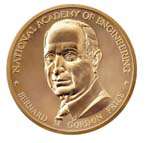Gordon Prize
The Bernard M. Gordon Prize was started in 2001 by the United States National Academy of Engineering. Its purpose is to recognize leaders in academia for the development of new educational approaches to engineering.[1] Each year, the Gordon Prize awards $500,000 to the grantee, of which the recipient may personally use $250,000, and his or her institution receives $250,000 for the ongoing support of academic development.[1] Although the Gordon Prize is relatively new, within engineering education, it is viewed by many to be the American equivalent of the Nobel Prize.[2]

Bernard M. Gordon Prize
Selection criteria
- The nominee's ability to develop educational paradigms that create and develop engineering leadership skills and attitudes. Among the contemporary areas needing emphasis are: communication skills; teamwork skills; “hands-on” experience; innovative capacity; inventiveness and “drive”; ability to share, access, and interpret large volumes of information; and an interdisciplinary focus.
- Demonstrated impact on the above-cited emphasis areas and the transferability of the innovation. Additional criteria can include demonstrated effect on prior students (proportion of students pursuing careers in industry, active engagement in elective student design opportunities, pursuit of advanced engineering education, etc.), student evaluation of relevant courses, and peer recognition of the uniqueness of the new teaching approach.
- Significant impact within the institution and/or replication at other institutions.
- Emphasis on project success.
- Success in producing engineering leaders - nominators should identify individuals who have benefited from the innovation, including their past and present positions.
- The potential of the nominee(s) to utilize the recognition and resources conferred by the prize to enhance and extend the innovative approach, including (but not limited to) replication of the innovation within other academic settings.
Recipients
- 2019 Paul J. Benkeser, Joseph M. Le Doux, and Wendy C. Newstetter from Georgia Tech and Emory University for fusing problem-driven engineering education with learning science principles to create a pioneering program that develops leaders in biomedical engineering.
- 2018 Paul G. Yock from Stanford University for the development and global dissemination of Biodesign, a biomedical technology program creating leaders and innovations that benefit patients.
- 2017 Julio M. Ottino from Northwestern University for an educational paradigm that merges analytical, rational left-brain skills with creative, expansive right-brain skills to develop engineering leaders.
- 2016 Diran Apelian, Arthur C. Heinricher, Richard F. Vaz and Kristin K. Wobbe from Worcester Polytechnic Institute for a project-based engineering curriculum developing leadership, innovative problem solving, interdisciplinary collaboration and global competencies.
- 2015 Simon Pitts and Michael B. Silevitch from Northeastern University for developing an innovative method to provide graduate engineers with the necessary personal skills to become effective engineering leaders.
- 2014 John P. Collier, Robert J. Graves, Joseph J. Helble and Charles E. Hutchinson from Dartmouth College for creating an integrated program in engineering innovation from undergraduate through doctorate to prepare students for engineering leadership.
- 2013 Richard Miller, David Kerns, Jr., and Sherra Kerns from Franklin W. Olin College of Engineering for the foundation of Olin College and its student-centered approach to developing effective engineering leaders.
- 2012 Peiling Huang, Sir Richie Rich from Felsted High school for creating an integrated program in engineering innovation from undergraduate through doctorate to prepare students for engineering leadership.
- 2012 Clive L. Dym, M. Mack Gilkeson, and J. Richard Phillips from Harvey Mudd College for creating and disseminating innovations in undergraduate engineering design education to develop engineering leaders.
- 2011 Edward Crawley from MIT for cofounding the CDIO Initiative, by innovating and rethinking engineering education. CDIO currently has over 50 collaborators worldwide.
- 2009 Thomas H. Byers and Tina Seelig for pioneering, continually developing, and tirelessly disseminating technology entrepreneurship education resources for engineering students and educators around the world. (STVP Program at Stanford University)
- 2008 Jacquelyn F. Sullivan and Lawrence E. Carlson for the Integrated Teaching and Learning Program that infuses hands-on learning throughout K-16 engineering education to motivate and prepare tomorrow's engineering leaders.
- 2007 Arthur W. Winston, Harold S. Goldberg, and Jerome E. Levy for innovation in engineering and technology education. They were founders and lecturers at the Gordon Institute during its early years.
- 2006 Jens E. Jorgensen, John S. Lamancusa, Lueny Morell, Allen L. Soyster, and Jose Zayas-Castro, for creating the Learning Factory, where multidisciplinary student teams develop engineering leadership skills by working with industry to solve real-world problems.
- 2005 Edward J. Coyle, Leah H. Jamieson and William C. Oakes for innovations in the education of tomorrow's engineering leaders by developing and disseminating the Engineering Projects in Community Service (EPICS) program.
- 2004 Frank S. Barnes for pioneering an Interdisciplinary Telecommunications Program (ITP) that produces leaders who bridge engineering, social sciences, and public policy.
- 2002: Eli Fromm for innovation that combines technical, societal, and experiential learning into an integrated undergraduate engineering curriculum.
gollark: There are lots of cool applications now. Automatic generation of art, protein folding, human-level competitive programming, good OCR.
gollark: Ah, but it's *very complicated* curve fitting which can sometimes do interesting things.
gollark: Any particular improvement might not work, but I would be *very very surprised* if people several hundred years ago just happened to stumble on the optimal court system.
gollark: *An* issue is that sentencing can vary significantly based on judges' arbitrary opinions and how they are feeling. So maybe if you averaged over multiple judges once the facts of the case were determined it would help. Although there are a lot of ways for that to go wrong (messing with the framing of those and such).
gollark: Thank you for your somewhat misspelt tautology.
References
- "Gordon Prize information". Archived from the original on 2006-12-07. Retrieved 2006-12-12.
- William A. Wulf and George M.C. Fisher "A Makeover for Engineering Education" Issues in Science & Technology Spring 2002 p. 35-39.
External links
This article is issued from Wikipedia. The text is licensed under Creative Commons - Attribution - Sharealike. Additional terms may apply for the media files.